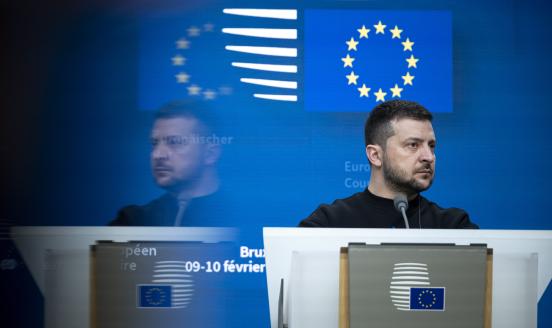Bruegel - Financial Times Forum: The future of euro-area governance
The third event in the Bruegel - Financial Times Forum series looked into the future of euro-area governance.

Speakers
Maria Demertzis
Senior fellow
Gideon Rachman
Chief Foreign Affairs Commentator, Financial Times,
Manfred Weber
Chair of the EPP Group, European Parliament,
video & audio recordings
At this event, we used Slido to conduct polls.
What are the missing pieces of the euro-area architecture? How to go beyond the current visions of euro-area governance?
How should the new European Monetary Fund work, in order to break the sovereign-bank link? What are the broader strategic implications for Europe's position in the world?
Manfred Weber, Guntram Wolff and Gideon Rachman explored the next steps needed to create a more functional and coherent economic governance framework. This event was moderated by Maria Demertzis.
Summary
With improved economic conditions in the EA as well as increased trust in the common currency, the debate not only focused on subdued reforms, but also on a potential new status quo for the EA. However, with awareness that more reforms are needed, there exist both temporary as well as structural obstacles that impede further progress.
Potential objectives and visions for the EA …
- Complete banking union – the European Deposit Insurance Scheme and a common backstop for the Single Resolution Fund are still outstanding
- Redefine priorities in budget – identify areas in which EA/EU can contribute most and channel resources towards them e.g. migration, macroeconomic stabilization
- Improve risk sharing – instruments such as mutual or contingent debt or a budget line that supports the EA economy during downswings are crucial pillars in other monetary unions
- Safeguard democracy – strengthen the role of European Parliament to guarantee independent institutions
- Reduce asymmetries – e.g. fiscal rules determine maximum deficit, but allow for discretion on the upside
… and obstacles to achieve them
Temporary
- National elections – e.g. political German gridlock hampered progress in reforms
- Lost momentum – Brexit, changing dynamics in the USA, improved economic conditions side-line EA reforms
Structural
- Mistrust – across nations as well as between nations and EU institutions manifest diverging visions
- Sovereignty – opposed to the development of other federations, European nations have well developed government functions which leaves less roles for EU and therefore, reluctance to transfer sovereignty
- Unanimity condition – finding a progressive compromise based on unanimous agreement impedes major reforms
Event notes by David Pichler, Research Assistant.
This event was jointly organised with the Financial Times, one of the world’s leading business news organisations, recognised internationally for its authority, integrity and accuracy.







